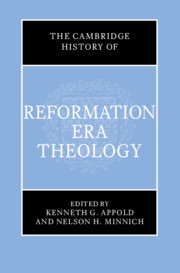Book contents
- The Cambridge History of Reformation-Era Theology
- The Cambridge History of Reformation-Era Theology
- Copyright page
- Contents
- Figures
- Acknowledgments
- Contributors
- Abbreviations
- Introduction
- Part One Theology in an Age of Cultural Transformation
- Part Two Schools and Emerging Cultures of Theology: Diversity and Conformity within Confessions
- 10 The Faculty of Theology of Paris (1474–1682)
- 11 The School of Salamanca
- 12 The Schools of Louvain and Douai: The Bible, Augustine, and Thomas
- 13 The Jesuit School of Theology
- 14 Theological Currents in Latin America (Sixteenth Century)
- 15 Diversity and Conformity within Early Lutheranism
- 16 Reformed Schools of Theology
- 17 Cultures of Theology in the British Isles
- 18 Radical and Dissenting Groups
- 19 Christian Ecumenical Efforts
- 20 Western “Confessions” and Eastern Christianity
- Part Three Topics and Disciplines of Theology
- Index
- References
13 - The Jesuit School of Theology
from Part Two - Schools and Emerging Cultures of Theology: Diversity and Conformity within Confessions
Published online by Cambridge University Press: 27 September 2023
- The Cambridge History of Reformation-Era Theology
- The Cambridge History of Reformation-Era Theology
- Copyright page
- Contents
- Figures
- Acknowledgments
- Contributors
- Abbreviations
- Introduction
- Part One Theology in an Age of Cultural Transformation
- Part Two Schools and Emerging Cultures of Theology: Diversity and Conformity within Confessions
- 10 The Faculty of Theology of Paris (1474–1682)
- 11 The School of Salamanca
- 12 The Schools of Louvain and Douai: The Bible, Augustine, and Thomas
- 13 The Jesuit School of Theology
- 14 Theological Currents in Latin America (Sixteenth Century)
- 15 Diversity and Conformity within Early Lutheranism
- 16 Reformed Schools of Theology
- 17 Cultures of Theology in the British Isles
- 18 Radical and Dissenting Groups
- 19 Christian Ecumenical Efforts
- 20 Western “Confessions” and Eastern Christianity
- Part Three Topics and Disciplines of Theology
- Index
- References
Summary
To think about Jesuit theology in terms of a distinctive “school” means to grapple with fundamental issues in the history of early modern theology and in the development of modern Western thought more generally. On the one hand, the world of post-Reformation theologians was assuming an increasingly globalized, plural, and multi-faceted dimension, and the Society of Jesus was theologically, intellectually, and structurally better equipped than other religious orders to engage with the manifold challenges of this rapidly widening context. On the other hand, the Society made a sustained effort to keep this multiplicity solidly tied around a specific theological, and not just institutional or cultural, unity. The fact that the Society was distinctively subject to, and thrived on, this tension between centripetal and centrifugal forces is at the core of the Jesuits’ theological identity, which is itself characterized by a complex and intellectually vibrant tension between unity and multiplicity.
- Type
- Chapter
- Information
- The Cambridge History of Reformation Era Theology , pp. 218 - 232Publisher: Cambridge University PressPrint publication year: 2023

